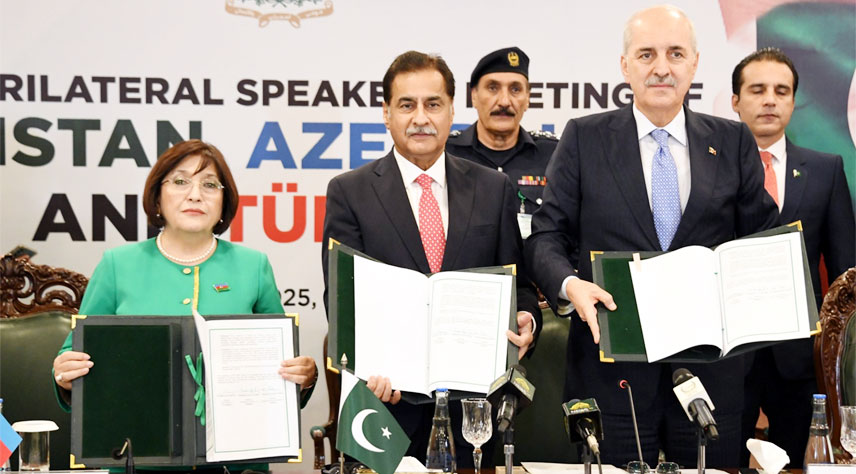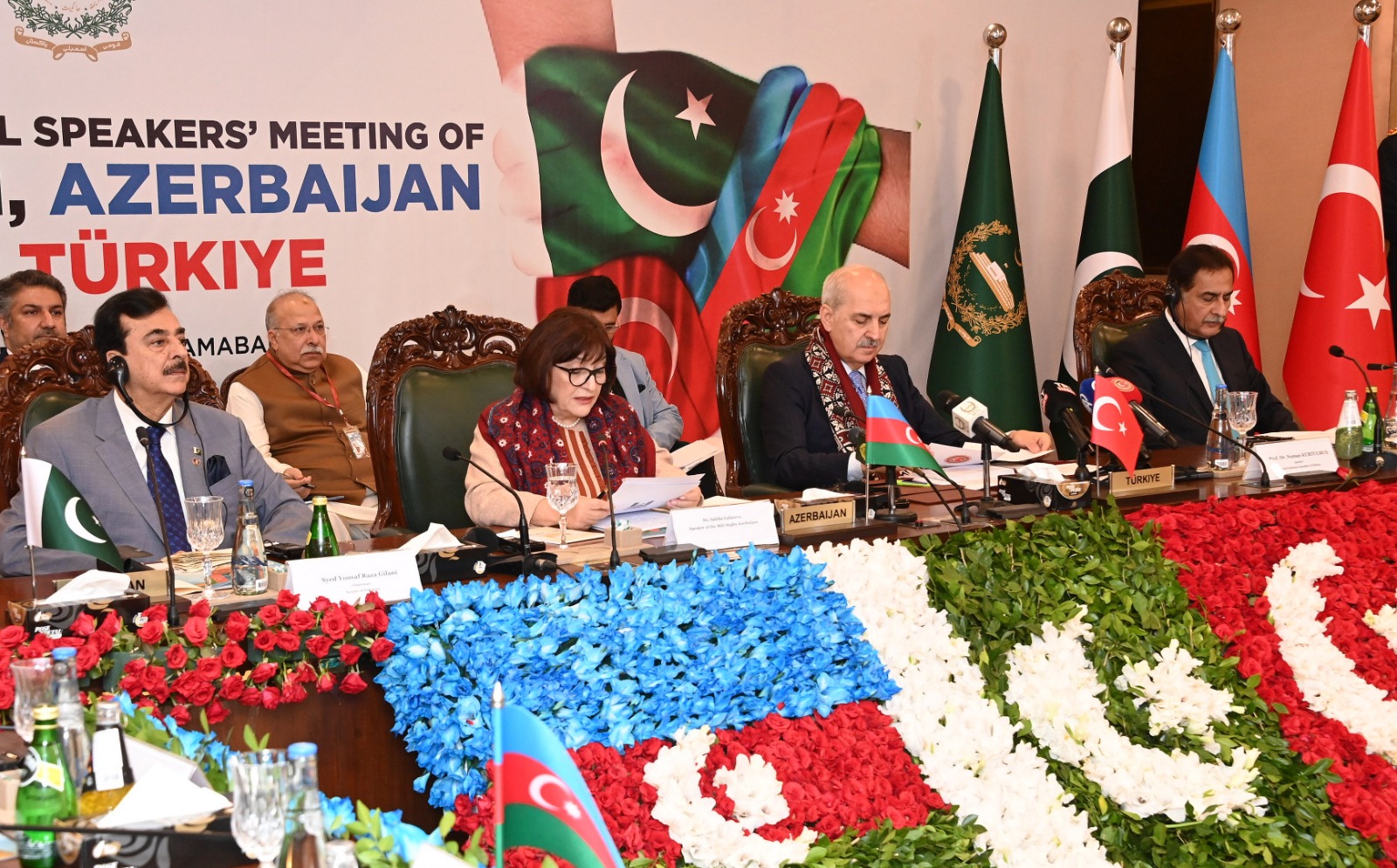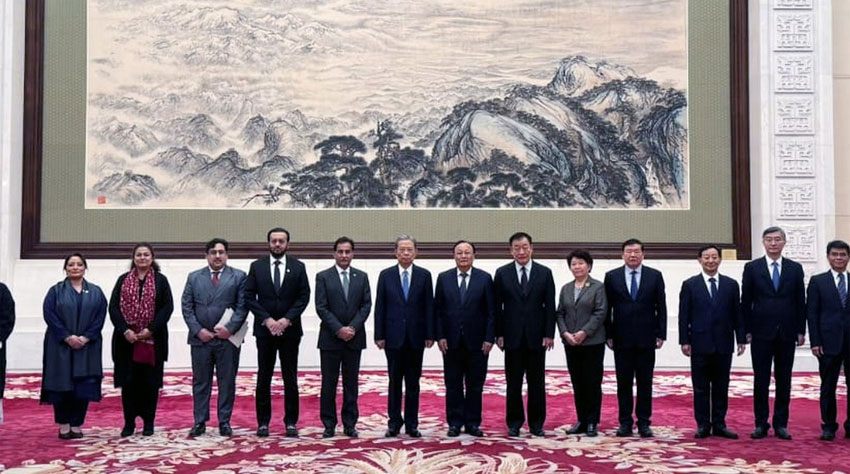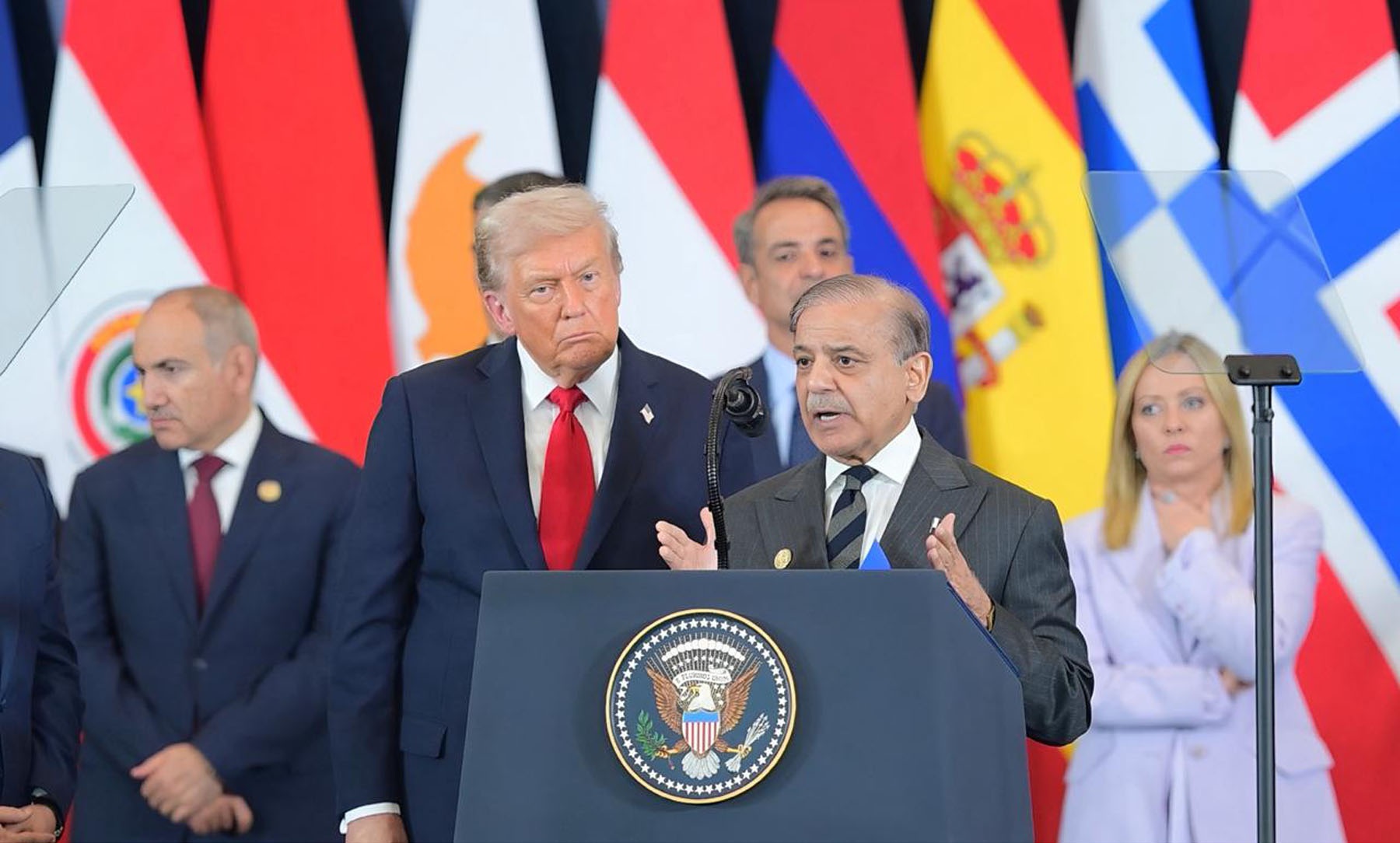ISLAMABAD (Sabahuddin Qazi) – The parliamentary leaders of Pakistan, Türkiye, and Azerbaijan, at the culmination of the Third Trilateral Speakers’ Meeting in Islamabad, have formally adopted the Islamabad Declaration — a strategic roadmap affirming their shared commitment to peace, justice, cooperation, and principled diplomacy in a turbulent regional environment.
Setting the Stage: Context & Significance
The Trilateral Speakers’ Meeting in Islamabad brought together Speaker Sardar Ayaz Sadiq (Pakistan), Madame Sahiba Gafarova (Azerbaijan), and Speaker Numan Kurtulmuş (Türkiye). The initiative builds on previous trilateral parliamentary engagements (notably the Baku meeting in 2021 and subsequent sessions) as part of a broader push to institutionalize parliamentary diplomacy among these brotherly nations.
By launching the Islamabad Declaration, the three countries seek to go beyond rhetoric — paving a structured, actionable path for regional collaboration. The document is both symbolic (reflecting shared identity and resolve) and programmatic (laying down specific priorities).
Core Pillars of the Islamabad Declaration
1. Peaceful Resolution of Kashmir Dispute & Respect for International Law

One of the most emphatic points in the Declaration is the call for a peaceful resolution of the Jammu & Kashmir dispute in line with UN Security Council resolutions. Any alteration of Kashmir’s demographic composition was cautioned against, as that could destabilize the region further.
The Declaration underscores that Kashmir is not just a bilateral issue but a matter of regional and global peace. The speakers emphasized that respect for international law, sovereignty, and multilateral frameworks should guide conflict resolution.
2. Unity Through Shared Values, Culture & Historical Bonds
The speakers reaffirmed that Pakistan, Türkiye, and Azerbaijan are linked not only by strategic interests but by history, faith, culture, and shared moral principles. They committed to deepening cooperation across political, security, economic, scientific, environmental, and cultural spheres.
This narrative of “fraternal states” provides both the emotional glue and the legitimacy for sustained institutional collaboration.
3. Combating Terrorism & Proxy Warfare
The Declaration identifies terrorism — including the manipulative use of proxy groups — as a global menace. It calls for joint strategies, intelligence sharing, and concerted efforts to root out extremism.
In connection with Pakistan’s own security challenges, the Declaration emphasizes that destabilizing actions from beyond borders (including across Afghan soil) must be countered through regional mechanisms.
4. Climate Change, Environmental Cooperation & Sustainable Development
Recognizing that member states are vulnerable to climate shocks, the Declaration calls for integrated climate action, green energy, eco-friendly technologies, and enhanced access to climate finance, especially for developing nations. It also welcomed COP29 in Baku as a stage for collective climate diplomacy.
Additionally, the speakers pledged to align efforts with SDGs (Sustainable Development Goals), environmental resilience, and infrastructural sustainability.
5. Women, Youth & Public Diplomacy
The Islamabad Declaration affirms that women and youth must have an active role in decision-making processes. It advocates stronger youth exchange programs, forums, public diplomacy, and parliamentary engagement platforms.
This inclusion signals an understanding that legitimacy and sustainability of policies require broader participation, not just elite consensus.
6. Solidarity with Palestine & Gaza, and Response to Humanitarian Crises
The speakers expressed unwavering support to the Palestinian cause. The Declaration condemns Israeli aggression, demands humanitarian aid, and calls for an independent Palestine with Al-Quds Al-Sharif as its capital — all in accordance with UN resolutions.
It labels the Gaza crisis and Indian aggression in IIOJK as wounds on humanity’s conscience — urging the international community to respond with justice and empathy.
7. Support for Azerbaijan, Connectivity & Defence Cooperation
The Declaration reaffirmed support for Azerbaijan’s efforts to rehabilitate territories affected by conflict (especially from landmines) and assist IDPs (Internally Displaced Persons) return safely.
It also commits to strengthening trilateral defense cooperation, parliamentary exchanges, and major connectivity projects (East-West, North-South corridors), bridging networks across the region.
Implications & Challenges
Symbolic Wins with Strategic Weight
While the Islamabad Declaration is not a legally binding treaty, its significance lies in parliamentary legitimation of foreign policy. It elevates these trilateral ties from executive-level diplomacy to institutional commitments.
It also sends a strong message to regional and global audiences that Pakistan, Türkiye, and Azerbaijan see themselves as a united front on critical issues such as Kashmir, Palestine, terrorism, and climate justice.
Building Mechanisms, Not Just Statements
The real test lies in implementation — translating broad declarations into concrete programs. Coordinated legislation, shared budgets, joint institutions, and regular follow-up will be required to make the Islamabad Declaration more than just aspirational.
Balancing National and Regional Interests
Each country has its domestic pressures and geopolitical constraints. As they collaborate, they must manage internal political sensitivities, divergent security concerns, and outside influences (e.g., from India, Iran, Russia, Afghanistan).
External Resistance & Diplomatic Pushback
The Declaration’s firm stance on Kashmir and Palestine risks friction with powers that oppose such positions. The participating nations may face diplomatic backlash or pressure. Whether they can maintain collective resolve under external scrutiny will be telling.
Resource Constraints & Capacity
For many of the proposed initiatives — especially in climate finance, green energy, connectivity — adequate funding, technical capacity, and coordination will be required. Mobilizing resources and institutional capacity (parliamentary staff, committees, monitoring bodies) is essential.
Why Islamabad Declaration Matters
-
Parliamentary Legitimacy: Elevates foreign policy issues into institutional bipartisan frameworks.
-
Regional Signaling: Demonstrates a shared front, especially in Muslim world politics.
-
Institutional Continuity: If sustained, may evolve into standing trilateral bodies or secretariats.
-
Issue Holism: Combines security, environment, youth, and humanitarian axes under one umbrella.
-
Platform for Advocacy: Parliamentary delegations worldwide can carry the narrative of Islamabad Declaration to other legislative forums (e.g. IPU, PUIC, APA).
Conclusion
The Islamabad Declaration stands as a bold expression of intent from Pakistan, Türkiye, and Azerbaijan to chart a new trajectory of regional solidarity grounded in parliamentary diplomacy, justice, and multi-issue collaboration.
However, the path ahead demands institutional follow-through, political courage, and resource mobilization. The Declaration’s real impact will be measured not in word count but in legislative action, coordinated policies, and sustained cooperation across security, climate, trade, human rights, and regional connectivity.
In a region beset by overlapping crises, the Islamabad Declaration is a hopeful signal: that three brotherly nations are choosing to confront challenges together — not in isolation.
Mr. Sabahuddin Qazi is known for his insightful political reporting and media management thorough coverage of parliamentary affairs.



